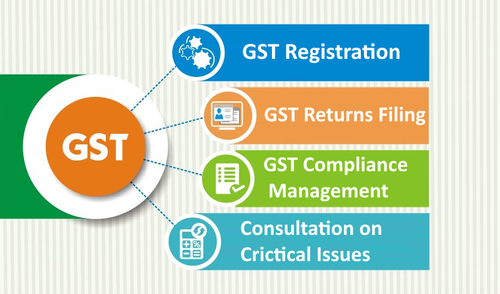From Beginning To End: A Comprehensive Overview of GST Enrollment and Exactly How to Efficiently Register Your Service
Browsing through the complex procedure of GST registration can be a vital action for any kind of business aiming to establish compliance and authenticity in the market. Why choose CFO Account & Services for GST registration in Singapore. From understanding the basic ideas of GST to satisfying the eligibility requirements and gathering the required documentation, the trip in the direction of successful registration can often appear like an overwhelming task. With the right advice and understandings, services can simplify this procedure and unlock the benefits that come with being a registered entity.
Recognizing GST and Its Importance
Recognizing the Product and Solutions Tax (GST) and its value is necessary for services operating in economies where this taxes system is carried out. By allowing companies to claim input tax obligation credits on the tax obligation paid on purchases, GST makes sure that taxes are calculated just on the value included at each phase of the supply chain.
Furthermore, GST advertises compliance and transparency in the tax regime, minimizing tax evasion and boosting government profits. It simplifies tax administration and compliance for businesses by supplying a common system for tax obligation filing and payment. Generally, a detailed understanding of GST is important for businesses to efficiently browse the complexities of the tax obligation system and ensure conformity with the regulation.
Eligibility Standards for GST Registration
To sign up for GST, businesses need to meet details eligibility requirements outlined by the tax authorities. The main demand for GST registration is that the organization's aggregate turnover surpasses the limit established by the government, which varies by state. As of the existing guidelines, organizations with an annual turnover of Rs. 40 lakhs or more in a lot of states have to register for GST. For businesses operating in northeastern states and uneven areas, the limit is Rs. 20 lakhs. Additionally, particular businesses, such as those involved in inter-state supply of goods or services, informal taxed individuals, and non-resident taxed individuals, are required to register for GST no matter their turnover.
Additionally, services entailed in providing products or services through shopping systems are likewise mandated to register for GST, irrespective of their turn over. Organizations that were signed up under the previous tax obligation program, such as Barrel, excise duty, or service tax, have to transition their enrollment to GST. Following these eligibility criteria is crucial for services seeking to abide by the GST guidelines and avoid any kind of fines for non-compliance.
Documents Required for GST Enrollment
Moreover, records verifying the identity and address of the marketers or companions associated with business, such as frying pan card, Aadhaar card, or ticket, are important for GST registration. Savings account declarations or canceled cheques showing the name of the address, account, and company number are additionally mandatory to confirm the checking account information provided during enrollment.
Guaranteeing all the needed papers are in order and conveniently available will streamline the GST enrollment procedure and assistance organizations stay clear of hold-ups or issues.
Online Registration Process for GST

After completing the kind, hop over to these guys supporting records need to be uploaded based on the standards offered. These records normally include evidence of business enrollment, address evidence, bank declarations, and identity proof of business owner. It is necessary to make certain that all files are clear, legitimate, and uploaded in the specified style to prevent hold-ups in the enrollment procedure.
As soon as the application and documents are sent, businesses can track the status of their GST registration online. If there are no issues or added information called for, the GST enrollment certificate will be released digitally, marking the effective conclusion of the online visit here enrollment process.
Post-Registration Conformity and Tips

Additionally, services need to preserve appropriate account books, including invoices, accountancy records, and financial statements, to support the details given in GST returns. Normal audits and settlements must be carried out to make sure data accuracy and conformity with GST regulations. Additionally, companies ought to stay upgraded on any type of modifications in GST policies, rates, or compliance treatments to make needed modifications quickly. Looking for professional aid from tax obligation specialists or accountants can additionally assist businesses browse complex GST conformity needs properly. By staying aggressive and alert in post-registration compliance, organizations can prevent charges, keep great standing with tax authorities, and foster operational effectiveness.
Verdict
In conclusion, the process of GST enrollment is essential for services to abide by tax laws and operate lawfully. By recognizing the qualification criteria, gathering the necessary files, and finishing the on-line enrollment process, companies can effectively register for GST. When required to make sure smooth procedures., it is vital to stay compliant with post-registration needs and seek professional assistance (Why choose CFO Account & Services for GST registration in Singapore).
Services that were signed up check out this site under the previous tax obligation regimen, such as VAT, import tax responsibility, or service tax obligation, must transition their registration to GST. The vital files required for GST registration include proof of business enrollment or unification such as the Certification of Consolidation, partnership action, or registration certificate.Upon effective conclusion of the GST registration process, businesses should quickly adhere to post-registration conformity needs to preserve governing conformity and make sure smooth operations.In final thought, the procedure of GST registration is necessary for organizations to comply with tax regulations and run legally. By understanding the qualification criteria, collecting the essential papers, and finishing the on the internet enrollment process, businesses can efficiently register for GST.
Comments on “Why CFO Account & Services is the Preferred Option for GST Registration in Singapore”